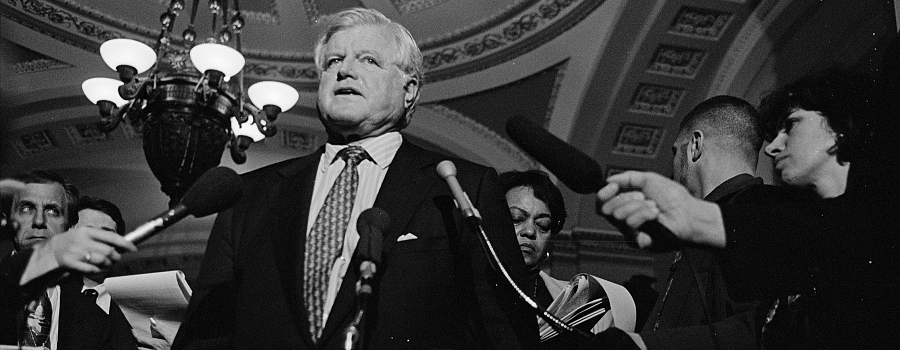
Photo: Senator Ted Kennedy speaking to the press, 1998.
Introduced by Sen. Ted Kennedy as S. 1218 to the 109th Congress (2005-2006) and as S. 2229 to the 110th Congress (2007-2008). Companion legislation was filed by Rep. John Dingell as H.R. 2034 to the 109th Congress (2005-2006) and as H.R. 4683 to the 110th Congress (2007-2008).
Index of Information on the Medicare for All Act
- Details of the Medicare for All Act
- Information on the Senate Bills, S. 1218 and S. 2229
- Information on the House Bill, H.R. 2034 and H.R. 4683
Details of the Medicare for All Act
The Medicare for All Act would gradually expand healthcare coverage to cover all citizens and documented residents in the country. Benefits under the program would be phased in by age under this schedule:
- First 5 years: covers legal residents under age 20 and over age 55;
- Next 5 years: covers under age 30 and over age 45;
- 11th year: covers all citizens and legal residents.
The program would be nationally financed through a 7% employer payroll tax and a 1.7% employee payroll tax. All eligible residents would have the choice of enrolling in a national, public health plan based on Medicare, or in a federally-approved private health plan. No premiums would be charged in either case, but the public program would have cost sharing - reduced or eliminated for low-income people - as determined by the Secretary of Health & Human Services. Private insurers would have to contract with the federal government and meet national standards to offer coverage, in the same way as the Federal Employees Health Benefits Program (FEHBP). Licensed private insurers would then be paid by the federal government on a per capita basis for each enrolled individual, risk adjusted depending on the health status of the individual. Private insurers would have to offer benefits and cost-sharing no worse than plans offered through the FEHBP.
Hospitals, doctors, and other providers would be paid by the public program using a similar fee schedule and payment methodology as Medicare, while private insurers would determine their own payment methodology with providers.
Existing public health insurance programs such as Medicaid, SCHIP, the Veterans Administration, and the Indian Health Services would be preserved, but would become secondary payers, while the new national health plan would act as the primary payer.
Information on the Senate Bills, S. 1218 and S. 2229
Medicare for All Act, S.1218 - 110th Congress (2007-2008)
Read the full bill from 110th Congress (2007-2008).
Read the summary of S. 1218 from the 110th Congress (2007-2008).
See the list of 0 Congressional cosponsors for the 110th Congress (2007-2008).
Medicare for All Act, S.2229 - 109th Congress (2005-2006)
Read the full bill from 109th Congress (2005-2006).
Read the summary of S. 2229 from the 109th Congress (2005-2006).
See the list of 0 Congressional cosponsors for the 109th Congress (2005-2006).
Information on the House Bill, H.R. 2034 and H.R. 4683
Medicare for All Act, H.R.2034 - 110th Congress (2007-2008)
Read the full bill from 110th Congress (2007-2008).
Read the summary of H.R. 2034 from the 110th Congress (2007-2008).
See the list of 19 Congressional cosponsors for the 110th Congress (2007-2008).
Medicare for All Act, H.R.4683 - 109th Congress (2005-2006)
Read the full bill from 109th Congress (2005-2006).
Read the summary of H.R. 4683 from the 109th Congress (2005-2006).
See the list of 18 Congressional cosponsors for the 109th Congress (2005-2006).
